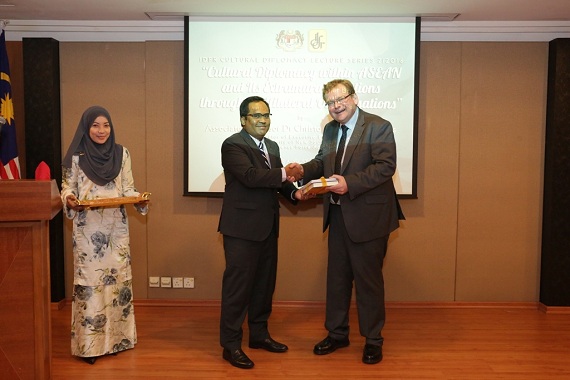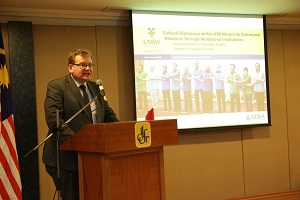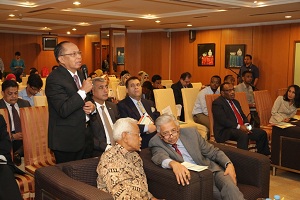
On the 25 August 2016, the second Cultural Diplomacy Lecture Series (CDLS) titled “Cultural Diplomacy within ASEAN and Its Extramural Relations through Multilateral Organisations”, was held at IDFR and delivered by Associate Professor Christopher Roberts from the University of New South Wales (UNSW). Several important issues were highlighted during the session, for instance, cultural diplomacy and the ASEAN Way, the regional order of the Southeast Asia at the time of ASEAN’s formation, traditional and non-traditional security cooperation, external engagements, challenges in the strategic and economic domains and intramural unity in the face of great power influence in the region.
Assoc. Professor Chris Roberts shared some crucial information on cultural diplomacy during the session with the audience. The keywords used to highlight cultural diplomacy among others were aimed at building a robust understanding of a nation through cultural ties across the globe. One of the interesting viewpoints brought forward was the concept of ASEAN solidarity in a diverse social context with Bangkok Declaration being introduced as the unifying factor within ASEAN, by empowering its economic growth, social progress and cultural development, thus subsequently leading to regional peace and stability in the region.
He highlighted some institutional challenges that occurred between Southeast Asia, East Asia and the Trans-Pacific Partnership focusing on Vietnam as the case study. The speaker also touched on The Economic-Strategic Nexus in the case of the South China Sea and the 2012 Joint Communique. In addition, the hallmark of the socio-cultural achievements within ASEAN as stated by the speaker was through the media. Additionally, an ASEAN centric education is becoming the primary goal to increase participation across the region by providing more scholarships and other aspects of cultural thematic integration.





